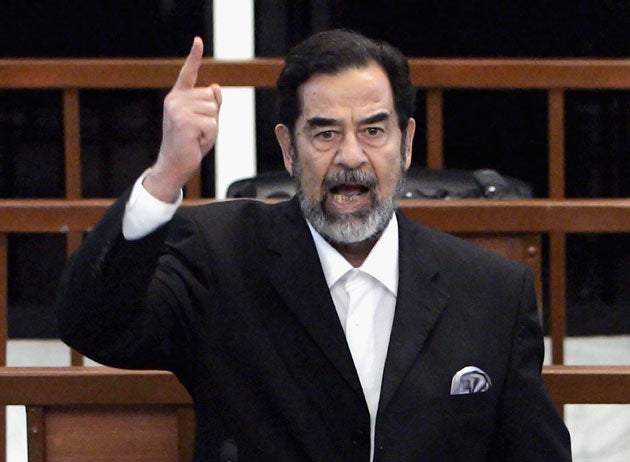From beyond the grave, Saddam reveals all (nearly)
FBI releases details of 20 sensational interviews with deposed Iraqi President after arrest

Your support helps us to tell the story
From reproductive rights to climate change to Big Tech, The Independent is on the ground when the story is developing. Whether it's investigating the financials of Elon Musk's pro-Trump PAC or producing our latest documentary, 'The A Word', which shines a light on the American women fighting for reproductive rights, we know how important it is to parse out the facts from the messaging.
At such a critical moment in US history, we need reporters on the ground. Your donation allows us to keep sending journalists to speak to both sides of the story.
The Independent is trusted by Americans across the entire political spectrum. And unlike many other quality news outlets, we choose not to lock Americans out of our reporting and analysis with paywalls. We believe quality journalism should be available to everyone, paid for by those who can afford it.
Your support makes all the difference.Some of the last, frank thoughts and confessions of President Saddam Hussein of Iraq have been revealed in transcripts of a remarkable series of interviews with the former dictator's interrogators.
Under questioning by the FBI during 20 formal interviews and at least five "casual conversations" over a four-month period from February to May 2004 after his capture by US troops in December 2003, Saddam said he had made a mistake in destroying Baghdad's stockpile of weapons of mass destruction (WMD) without independent verification from UN inspectors. He also told FBI interrogators that claims he had links with Osama bin Laden were incorrect.
On WMD, Saddam said Iraq's stockpile had been "eliminated" by UN sanctions. But such was his concern about neighbouring Iran that he did not allow inspectors into Iraq for fear of appearing weak. He felt Iraq was vulnerable and he would have sought a "security agreement with the US to protect [Iraq] from threats in the region".
Saddam remained defiant on military action against civilian Kurds, at one point dismissing reports of such an assault as "a lie". He also dismissed claims he had used body doubles to avoid assassination, and laughed: "This is movie magic, not reality."
The documents suggest that an extraordinary rapport developed over time between Saddam and his interrogator, George L Piro, one of the very few FBI agents who spoke Arabic.
Apparently more co-operative and willing to provide information to the FBI than at his subsequent trial, the former despot was questioned at the Baghdad airport military detention facility between 7 February – six weeks after he was discovered in an underground spider hole at a farmhouse – and 28 June 2004. He was later turned over to the Iraqi authorities, tried and executed by hanging on 30 December 2006.
Transcripts of the interviews were released last week in response to US Freedom of Information requests. Despite the sensitive nature of some of the material, only the last interview – on 1 May – is redacted, though one background document is heavily edited. The secret FBI files were seen by senior officials throughout the US government including, it is believed, the former US president George Bush.
Codenamed "High Value Detainee #1", Saddam was interviewed at length on subjects ranging from WMD to the bloody history of the Iraqi Ba'athist regime.
During a series of conversations, he claimed North Korea was the only country likely to rush to his aid and said he shared President Bush's hostility towards the "fanatic" Iranian mullahs.
Despite claiming he would never admit to his enemies that he had made mistakes, Saddam said he had erred in destroying Iraq's stockpile of WMDs without independent UN verification, and claimed he allowed weapons inspectors back into Iraq in a desperate attempt to avert war, after British intelligence issued an "inaccurate" report claiming Baghdad was still pursuing its WMD strategy.
He refused to talk about Iraq's use of chemical weapons during the war with Iran, and the FBI records show he was also questioned about the use of chemical and biological weapons against the Kurds in Northern Iraq, although his answers are not revealed.
When asked about his greatest achievements, the former Iraqi leader cited social progress for ordinary Iraqis, a temporary ceasefire with the Kurds in the early 1970s, the nationalisation of Iraq's oil in 1972, and support for the Arab side during the 1973 Middle East war with Israel. He insisted he would be remembered for standing up against oppression, as well as surviving the brutal Iran-Iraq War and the UN sanctions. He said he believed Iraqis would look kindly on him after his death.
In the first interview, Saddam acknowledged that his interviewer was smart, adding: "Perhaps a conversation between two such educated people will not be useful or successful." In one of their last conversations, Saddam, clearly relaxed, joked with Mr Piro about his two half-brothers. Mr Piro then asked Saddam about Abid Hamid Mahmoud, Saddam's presidential secretary. Saddam said Abid was a good and loyal employee and asked Piro what he thought. Piro described to Saddam the meaning of a "used car salesman". Saddam laughed and said Piro was correct.
Throughout, Saddam sought to paint himself in a positive light, denying responsibility for political assassinations, stressing that he was used to living simply and insisting he did not live in palaces. He even claimed an interest in American culture and movies.
Join our commenting forum
Join thought-provoking conversations, follow other Independent readers and see their replies
Comments